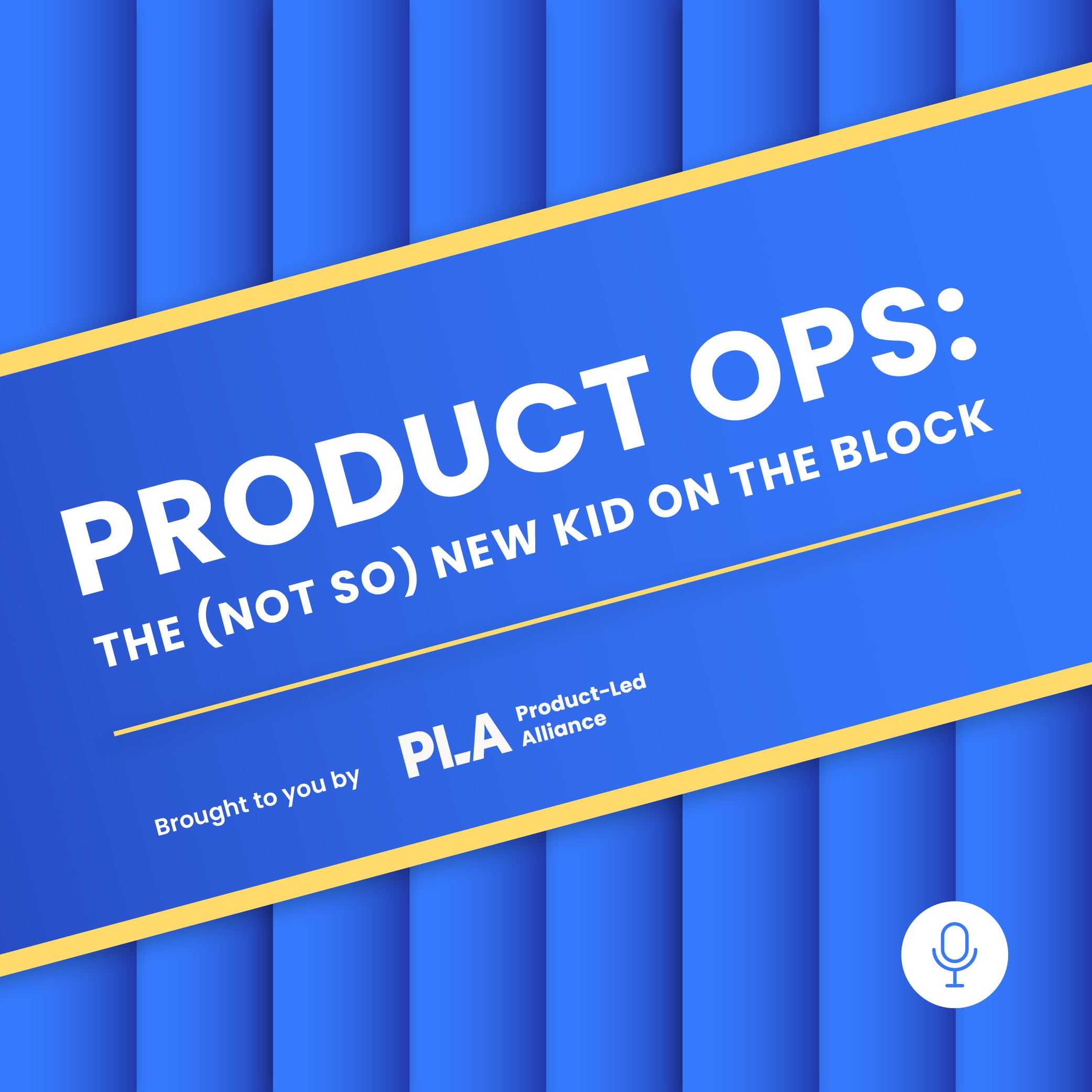This article is derived from the Product Ops Chronicles. Listen to the full episode here.
Graham Reed
Hello, everybody. Today, we’ll be exploring product operations and how, although this role and title is fairly new, the jobs that are being done have actually been here for a very long time.
Let me first introduce myself and my fantastic colleagues here. My name is Graham Reed, and I'm Head of Product Operations at Cobalt. I’m also very involved in the product operations community, as well as the fabulous Product-Led Alliance, who are hosting this for us today.
Antonia, do you want to introduce yourself?
Antonia Landi
Absolutely. Hi, my name is Antonia, I'm a Product Operations Consultant and Coach, and I'm really excited to be here.
Graham Reed
Fantastic. And Chris?
Chris Compston
Yeah, thanks, everyone. I'm Chris, and I'm also an independent Product Ops Consultant and Coach.
Product operations has always existed
Graham Reed
A few weeks ago, Antonia and I noticed a particular post on LinkedIn that was questioning if product operations is really needed. Should good product teams be covering a lot of these things that we do in the role without product operations managers? And actually, does the problem really lie with the product teams and product leadership itself? And why these things aren’t being covered.
We all had our reactions to this line of thinking, and I think that's what’s brought us here today and we really want to dive into that.
So, let's kick this off. Product operations: is it new? Or is it is it something that’s always been here?
Antonia, what do you think?
Antonia Landi
I think the confusion or this line of thinking comes from seeing this brand-new role being created. I think most of us had never heard of product ops until three, four, or five years ago, and I think all of us here are actually ‘veterans’ in the space, if we can call ourselves that.
In the beginning, I think it was also the same for me, looking at this as a brand new role. I didn't necessarily understand where it came from, and if it had always been there or not.
But the thing that really made it click for me was when I read that first fateful product ops job description that I ultimately got. I realized I’d been doing all of this this entire time, and this is exactly why I could step into a role like that without ever having officially done it before.
We‘d all been doing it, we just didn't have a name for it. We didn't think of it as something that was in addition to our day job, and we didn't think of it holistically. And I think that's what really makes the difference.
Graham Reed
Absolutely. I had exactly the same epiphany. And more recently, as I've started to think and talk a lot more about this, when I first started in product management 10-12 years ago, I was the only product manager. We didn't have product marketing, we didn't have designers, and we certainly didn't have product operations.
So, I was doing all of these things, and now, certainly in big organizations, we split these roles out.
With product marketing, there's a real segregation of skills between that and product management. And now, with product operations, we're allowing product managers to focus on the real, tangible deliverables to the market. Let them focus on the product and not focus on how they're operating or how they’re doing their job, but do their job. Not focusing on how they can make their job easier, faster, or stronger.
So, here we are with product operations. And actually, we’re in a world where these roles are now being split up. Exactly as you said, we were always doing this sort of thing. Certainly, years ago we were doing all of these things. We didn't necessarily have the time to do them all well or properly, but we were certainly doing them.
Chris, what's your experience been in this?
Chris Compston
Unsurprisingly, kind of the same. I think there's definitely a conversation around product operations, the role of product operations, and the function.
In terms of job title and role, looking back as a veteran, in 2020/2021, I actually had the job title. Prior to that, it was called something else.
Before that, as a consultant, I realized the function itself was something I'd been doing for many years, maybe even back to my early formative years in tech considering how we worked removing waste and trying to be more effective.
The commentary that I see around product ops is coming from people that are maybe already in the function. They're already doing some of this work, they just have a different job title, and that's absolutely fine. The work still needs to happen.
At the same time, there’s a bunch of other work that needs to happen, and I think you've touched upon some of these specific roles in product analytics, design, research, product management, and product strategy.
I’d prefer our teams to focus on what they're trying to achieve for the customer, and not exactly how they're trying to do it. We should allow our teams a deal of creativity, flexibility, and autonomy (if you want to open that can of worms) to understand how to solve those problems for their customers.
And I think in good product operations teams, we’re more enablers to those actions they need to take rather than coming in and being too process-heavy.
But I do see a lot of the commentary coming from people that are in organizations that aren’t quite ready for product operations, or are so mature and have been around for so long that operations as a function is part of many people's roles.
In the world of startups, you don't need product operations. Everyone should just be doubling down on product-market fit, understanding what customers need, and trying to monetize it. Operations become a sidebar conversation.
As the organizations mature, I think the places that we've worked in previously or where we currently are in that world of chaotic scaling, where standardizing something, reducing waste, and ensuring teams are effective is super important. And having a person totally dedicated to that sounds like a good thing to me.

Graham Reed
You've touched on a couple of really great, interesting points that I’d like to come back to, but I think the I think the one I'd really like to hand over to Antonia because I know you say a lot about this, is - when does a business lead product operations?
So many times in the product world, it really does depend. There's no one-size-fits-all.
You’re absolutely right, Chris; startups don't need product operations. You need to be focused on earning, making money out of it first, delivering your products, delivering your MVPs.
I think all of us have talked a lot about this, about what is the right time for product operations to come in.
Antonia, let me hand it over to you because you’ve spent a lot of time talking about this.
Antonia Landi
I’d like to challenge that notion a little bit because product operations exist in every company, regardless of whether we call it that or whether we have a dedicated person on it, etc.
It exists by virtue of product existing. Whenever product work needs to get done, product operations exist.
Now, whether that’s written or unwritten rules, whether that’s explicit or implicit, or whether that just happened, this is just how we get work done because we've always done it. It exists. So it's almost like a moot point.
Graham Reed
Allow me to rephrase that to ‘a dedicated role’ because you’re absolutely right. Product operations has always existed. It always will exist. And interestingly, this will then start to touch on to the next conversation we're going go on to which is talking about splitting the role from the function. But let's come back to that.
When is the right time for a dedicated product operations role?
Graham Reed
So about the role, when's the right time to have a dedicated role of product operations in a team?
Antonia Landi
I think it depends on a few different factors, at least from what I've seen. If you have an organization that was always incredibly mindful of how they get work done, and they grew and scaled with that in mind, in an organization like that, you might get to 500 people and 20 PMs before you think, Okay, I need a full-time, dedicated person to take a look at this.
If you're an organization that scaled really rapidly or in a really chaotic way, or maybe you have a bunch of less experienced folks coming together trying to make something happen, it might make sense to have a product ops person a little bit earlier in the game.
They might say, “Look, we're going expand in the next year. We want to do this properly. We don't want to have to do it when we need to change 500 people's minds as opposed to 200 people's minds, so let's invest early and set ourselves up for success.”
Both Chris and I have come to the conclusion that maybe there’s scope to do this in a fractional position. Maybe it's not necessarily something where you say, “We hire a team of four people to do product ops, and we’ll need that support for the rest of our organization’s life.
Maybe it’s the sort of thing where, especially for startups, you have someone come in quite early on to say, “I'm going to tell you now what's going to be important six months from now. We'll implement some best practices together, we'll make sure that the team’s set up for success, and then I'm going to come back in six months and check in and see how you're doing.”
Graham Reed
I think that’s super interesting because it's something I've had on my mind for a long time. I’ve talked to many people about this idea of having fractional product operations, product operations as a service, something very similar to this.
If you set product operations upright, you take something on, you improve it, and you hand this back to the teams. Firstly, there's not a role where in a perfect world you should be doing anything continuously or full-time.
Secondly, if you do product operations so well, you should almost talk yourself out of a job. There's a way that I've always looked at everything that I do, every part of the role that I do. I look at it and say, “I want to hand this back and never want to touch it again.” Very rarely does that ever happen, but that's the aim that you always have.
I've spoken to people about this before to say, “Are you trying to get yourself de-hired?” Yes, because that's the function of the role. I didn't want to be doing this. I want to help those people improve how they do things, and then move on and allow those people to do those things embedded in their role so they can do it without even thinking about it or without it being a burden or a chore to them.
So, can you come in, set up shop, walk away, allow people to do those things, and then have this check-in? What's the next phase?
Come back, do a little piece, come back a little bit later on. I think it's a way that the role will end up evolving into very successfully as well.
Chris Compston
Yeah, I think I’d add that what we're talking about here is product ops practitioners who have a varied level of experience and capability. We talk a lot about being generalists or specialized generalists. I think what we're talking about here is being enablers.
And the kinds of organizations that all three of us have been working in, we’ve been in that enablement position. As opposed to coming in relatively process-heavy, trying to impart some of our process, and then leaving, we're here to help the team support teams to become better in different ways, to help them be more efficient, more effective, etc.
Product operations is still a relatively new term in Europe. Outside of Europe, particularly in the US, it’s maybe a little bit more known, a little bit more specialized, and a little bit more understood as a specific role or team.
But just thinking about the type of people we are is more in that coaching and enablement space. And I wonder what someone who may have been running a team of 10 to 15 product operations managers might think about that, and the specialized roles they have and are very much focused on.
We kind of fit in that fractional, interim space, maybe not doing ourselves out of a job, but enabling a team to a degree that they’ve improved in certain areas that we may come back in the future and say, “Okay, now we've got to this level, let's think about these different things as well,”
This is opposed to a team that comes in and, much like many of the other roles in product development, have gone through that messy middle stage of understanding what the role is and how it adds value.
They’ve said, “Okay, for this type of organization, for this scale, this type of customer, this type of business that we're operating in, product operations looks like this to us. We're going to double down on that and really make sure it’s talked about a lot.”
It’s about insights, streamlining into teams, and getting both quant and qual insights into teams so they can act efficiently and effectively and achieve what they need for customers.
Product ops teams do that. I can't say as a practitioner of product ops that I focus on that solely to any kind of level, but teams are often brought in to do that and specifically look at that part. And they may do you three or four other very specialized things that other members of the team currently aren't doing for various reasons.
I think it's just that we're not in that space. We're more in that product coaching and enabling space.
Graham Reed
There's a vastness of the role, and there’s no one way to do it.




 Follow us on LinkedIn
Follow us on LinkedIn




